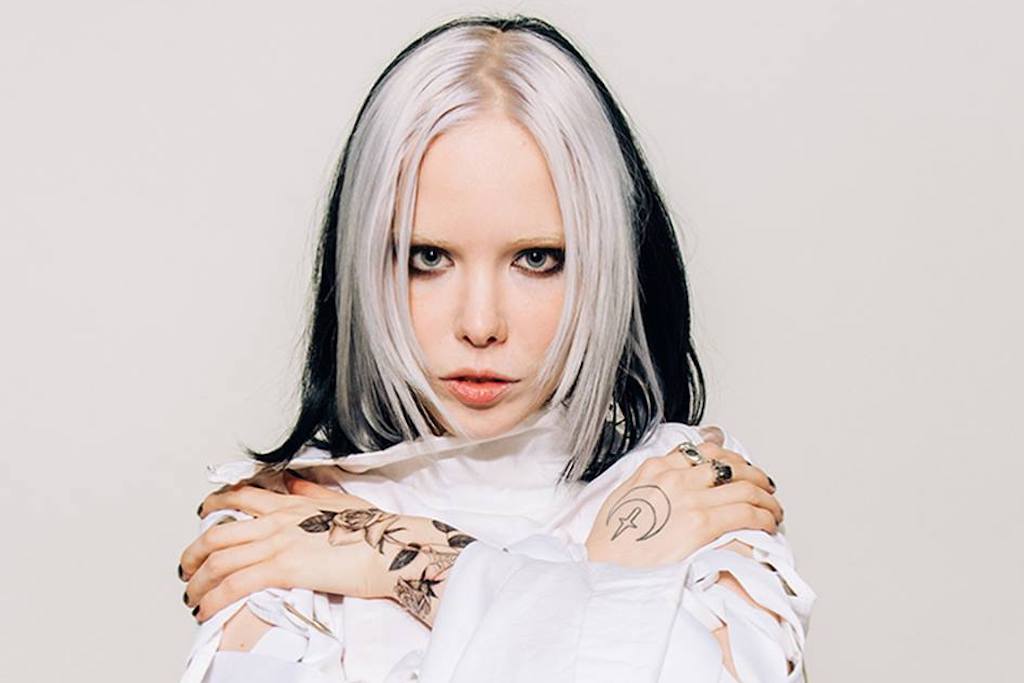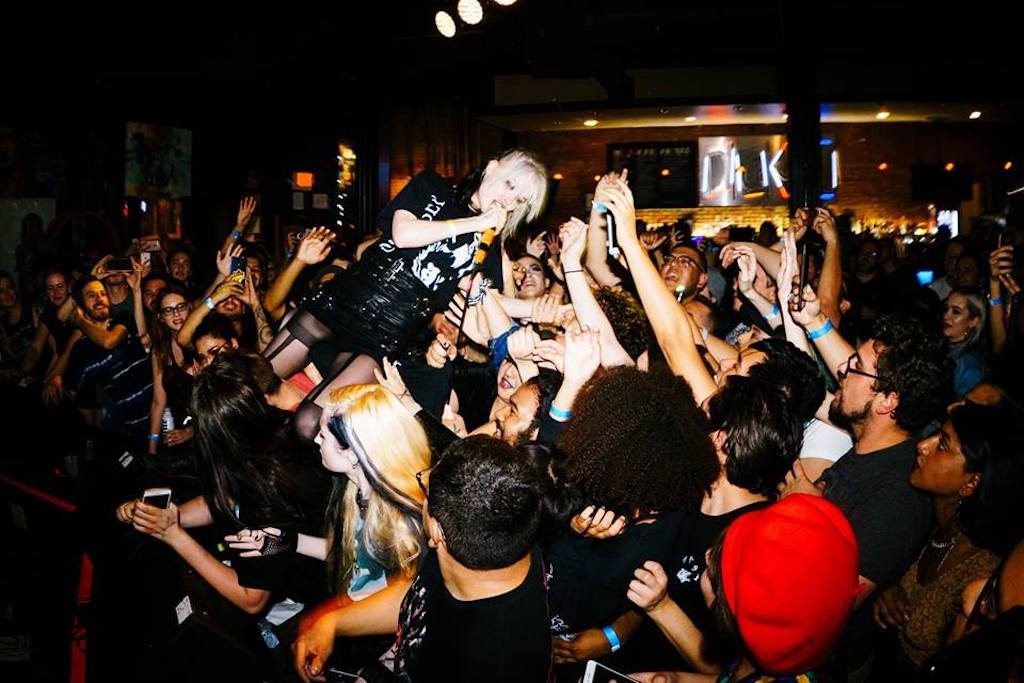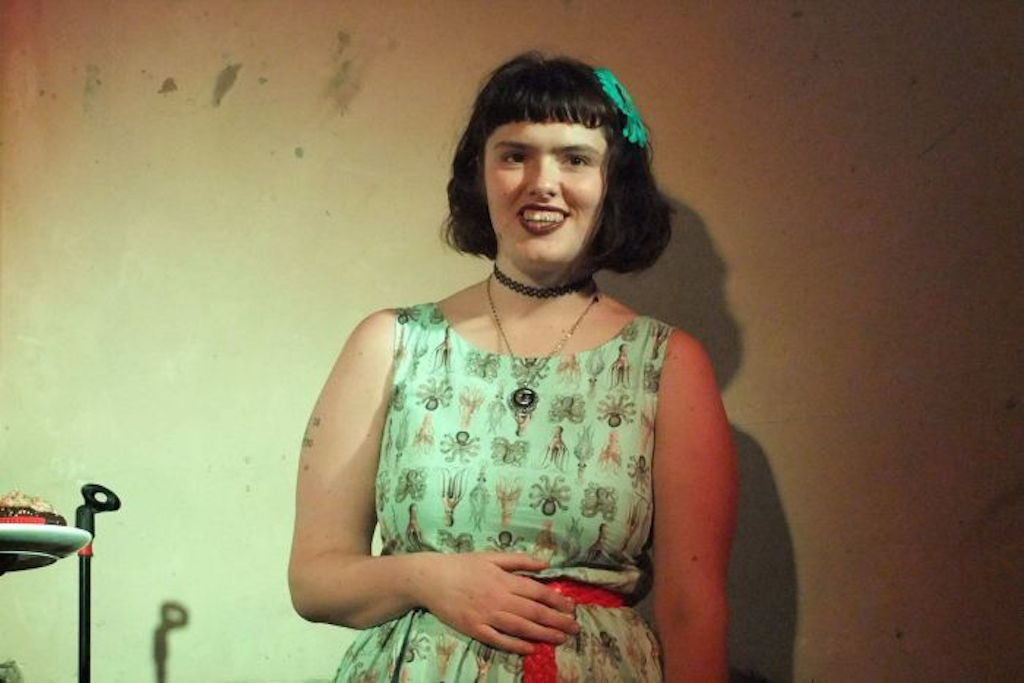“Anger Can Be Power”: Alice Glass On Moving Forward And Not Being A Perfect Survivor
"I spent so much time being afraid of other people without realising that I'm the strongest force in my own life."

Warning: this article discusses sexual assault, sexual violence and self-harm.
—
Alice Glass’ show at Sydney’s Oxford Art Factory was one of solemn anger, an industrial-electro thrashing through trauma. When Glass forgoes screaming, the synths and drums do it for her, the latter played live with urgency by her bandmate and partner, Jupiter Keyes.
To call the audience receptive is an understatement: it’s a small crowd and an unforgivably cold Tuesday night in June, but the room’s powered by palpable waves of tension and release.
Between songs, Glass asks the audience to hold men in their life accountable for their actions. “Abusive men and the people who enable them are bringing us down,” she said, her voice echoing through the microphone. For the most part, the crowd is quiet and filled with nodding heads — then Glass throws her body into the next song, and so does the audience. Release.
When Glass sits down with Junkee later that week, her words continue to echo out. Across Australia, calls for men to do better are louder than ever, after thousands attended national vigils that week for the thirty women murdered by males in Australia this year (at time of writing, the number is 32).
“I was reading about the endless statements the police had about making sure that you’re protected,” Glass tells me. “I feel like there should be anger right now. Anger can be power — I think that’s a The Clash lyric, but like, there’s only so much you can take.”
It’s slightly surreal to sit across from Glass in an Instagram-friendly sunlit café. It’s a far remove from her prevailing persona of the past decade, one of darkness and mystery: in her former band Crystal Castles, Glass never used to give interviews, and she hints that the process remains a little surreal for her too.
In 2014, she left Crystal Castles, whose caustic dance music was driven by an undefined sense of agony and anger. Glass wrote poetic lyrics and lullaby-like melodies distorted by her screams, stretched further by bandmate Ethan Kath’s knack for severe, apocalyptic soundscapes.
Last year, motivated by “momentum” the #MeToo movement, Glass posted a lengthy, detailed statement on her website alleging that Kath had sexually, emotionally and physically abused her — beginning shortly after the pair met when she was 15-years-old, continuing for more than a decade until Glass left Crystal Castles. Kath denies the allegations.
Glass’ solo music can be just as overwhelming as Crystal Castles’, but it is never nihilistic — her self-titled EP is a complex reckoning of trauma and self-worth. As Pitchfork wrote in its review, “Alice Glass can feel more like an exorcism than an evolution, a digestion of past trauma rather than a new chapter.”
Her upcoming debut album is that next step. Its lead single is ‘Mine’, a celestial song where self-harm becomes a metaphor of reclaiming one’s body. The melody’s beautiful, daresay poppy: the lyrics are unsettling and unnerving. When we meet, Glass asserts she is not a perfect survivor. There is no such thing.
In your interview with Pitchfork a couple months ago, you said that the stage was one of the few places that you felt in control. Does it still occupy that same space for you?
I’ve gotten so used to it being a source of comfort. And it’s sort of… anything can happen. If someone wants to jump on stage and try to fight me — not that that happens all the time– then it seems more like a raw experience for me.
I’m not great at the bureaucracy of the music industry, and that is such a big part of it. It’s really freeing to just be able to get up there and express yourself.
To just be up there and do the thing.
Yeah, exactly.
Understandably, you’ve previously said that there are Crystal Castles songs that you never wanna hear again or you don’t wanna play. So I was surprised to hear some at your show — ‘Alice Practice’, ‘Love And Caring’, ‘Celestica’ and ‘Suffocation’, specifically. How do you pick which ones you want to play?
I don’t know, it’s weird. It took a while to actually even listen to some of those songs before. And it was even hard listening to playlists, or to put on another artist and then one of the songs is “recommended.” I would have to turn it off right away. I was just a little too traumatised, I guess?
“If I have a microphone, if I have a platform to be able to speak the truth, I’m gonna do that.”
I played these songs for eight years straight and it’s such a huge part of my career. It didn’t seem fair that I would never play these songs that I feel like I have a strong connection to. I just put so much of myself into them over the years.
So, [after playing them] it was just realising that I did take something back, and it was okay.
Hearing them with your new material, they were given a new context and energy. A big part of that was how you spoke in-between songs about the necessity to hold abusers accountable. Given your audience, do you feel a necessity to say those sort of things on stage?
I mean, definitely. I think that there is a higher ratio of young women at my shows and that’s part of why I wanted to speak out about what happened to me anyway, feeling the responsibility to be honest. And if I have a microphone, if I have a platform to be able to speak the truth, I’m gonna do that definitely. I mean, [otherwise] what’s the point?
I don’t know, I didn’t go to music school or take a bunch of courses in university — I’m not completely sophisticated. All I have is the message and the most I can hope is to be able to express myself. And if I can do that, then I feel slightly successful.
Have you noticed a shift in the room in terms of your demographics — or even in terms of the air?
I think so. I think especially because it was a lot being involved with the EDM world. There’d be some concerts I would play where I would be the only woman on stage — and sometimes the only live artist.
Not to generalise, but I think it does say something when you’re a fan of music where the lead singer doesn’t do interviews and is kind of disconnected from the rest of the world, and doesn’t get to have any social commentary. I was kind of held back from doing stuff like this [interview] and speaking openly.
I think it was just a little bit of a different crowd that wouldn’t care — they’d go to a show and not really care what’s behind the live show and what’s behind the songs.
I only want to support people who aren’t assholes, who don’t take advantage of other people, who care about things.
Which I think a lot of people are coming to the realisation of doing, but it’s a tricky process. So many people are assholes — that’s what we’ve learned in the past year.
But there are small things you can do. With accusations of violence against women or hate crimes, you’ve gotta take those seriously. Just because you like a song doesn’t mean you need to support the artist behind it.
I noticed that when XXXTentacion passed away, you tweeted to shift the tributes outwards onto victims and survivors of abuse. Have you been surprised by the reaction online to his death?
rest in peace to all those who have lost their lives to domestic violence or hate crimes
— ALICE GLASS (@ALICEGLASS) June 19, 2018
It’s complicated because as a survivor it’s hard to even directly comment. Obviously a young man died but at the same time, this person did horrible things.
I think it’s better to think about how victims would feel having their abuser be praised on a mass level. And, just because someone’s a musician, an artist that you like, or famous, it doesn’t mean that they’re important or more valuable than other human life.
You just released ‘Mine’, which is one of your lighter, more celestial songs, though the lyrics detail self-harm. Were you hesitant to share it? That song could potentially be read as advocating for self harm.
I’m not gonna censor myself and how I feel, I just have to be honest. I’ve spent so many years sitting in the shadows and censoring myself and being concerned what strangers thought about me.
Yeah, that’s just how I felt at the time, and therefore I think it’s probably a relatable sentiment. But it is a self-destructible one — I think humans are complex, and that’s just one side. You can’t be a perfect survivor all the time.
And self-destruction is a relatable emotion and feeling.
It is. To me, it’s positive in a way. I spent so much time being afraid of other people without realising that I’m the strongest force in my own life. [That’s] the empowering side of it, even though it’s dark.
When did you first start writing solo music?
Jupiter gave me a couple of instrumentals that would just keep me holding on while I was finishing the last Crystal Castles tour. I’d get into my tour bunk and just listen to the songs over and over again, and go through melodies that I was gonna try. And it kept me optimistic and hopeful for the future. It was kind of a rough year, you know?
Did you ever contemplate going in a completely different direction and divorcing yourself from everything you’d ever done before?
Yeah, I mean I jumped around. I thought about starting a black metal band, or a punk rock band. But it just kept going back to electronica. I’m not sure what it is, but yeah.
I guess it’s always been there.
Yeah. I’m not sure that’s what it is does inspire me, how there’s no limitations to it. I’m not an amazing guitar player anyways. I mean, I’m never gonna write a black metal song better than Darkthrone. Kind of like, what’s the point anyway?
You’re working on your debut album — how are you approaching it?
I’m kind of trying to put into words everything that I’ve been going through the past few years.
[It’s a] cathartic experience — just getting the songs out there that I’ve been working on in my basement for years. And then just having them be out there, and then I’m just gonna start writing the second one, and I don’t know what that one’s gonna be about, but…
You just keep going.
Yeah. It’s gonna be good to finally get these songs out.

Via Alice Glass Facebook page.
I suppose it’s a little cliché, but it almost seems like an exorcism.
Yeah it’s a huge catharsis, like getting it out there, making everything seem like it’s actually real — instead of just songs I play over and over again in my basement. Even ‘Mine’, we wrote that song like three years ago. Having them come out is a little surreal. That seems like a cliché too but it’s true. It’s cliché for a reason.
Have you been able to talk to fans a lot while you’ve been touring?
Yeah, I’ve been getting to talk to some fans. I’m really lucky, some of my fans I considered friends and they’re incredibly supportive. I was always kind of afraid to talk to fans before. I felt sort of disconnected from it. But now that I’ve put myself out there so much, it feels more personal.
I’m not sure what they think about it, but I know that I feel more connected to strangers than ever before.
There was this realisation that perhaps we didn’t really know you after all these years when we thought we did. And so now, it’s like, ‘oh, hello, nice to meet you’.
Yeah, I feel that way too. Not that I was being a fraud before, but it was just one simplistic side of myself — [I was] this nihilist who doesn’t need friends, fun, or regular human connection. Which was something that I felt sometimes, but not all the time.
That’s the irony is that I was more afraid that people wouldn’t like the real person that I was. So I just kept it [hidden]. And I was told that if people got to know [me] that no one would come to the shows anymore.
And now it’s sort of like, ‘Well if that’s how it is, then that’s how it is.’ What are you gonna do? At least people can not like me for me.
—
If you or someone you know is impacted by sexual assault, domestic or family violence call 1800RESPECT on 1800 737 732 or visit 1800RESPECT.org.au. In an emergency, call 000.
Men can access anonymous confidential telephone counselling to help to stop using violent and controlling behaviour through the Men’s Referral Service on 1300 766 491.
